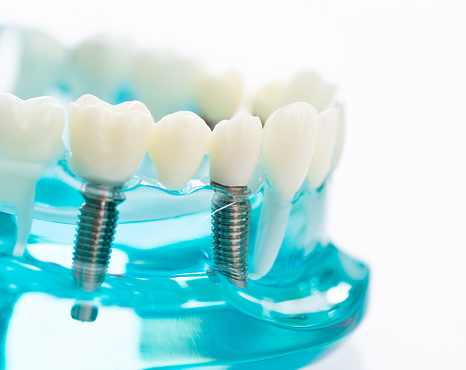One thing that patients who are getting a dental crown will quickly learn is that there are three primary types of crowns.
The reason a dental crown is needed is to help repair a badly damaged or decayed tooth. Because the dental crown is able to protect the natural tooth root, it is always recommended by a dentist when it is known that the tooth has become damaged or decayed too much to be saved any other way.
A dentist’s primary goal and focus are always in saving a person’s natural teeth and roots while keeping them in place in the mouth to ensure no other oral health issues pop up.
What are dental crowns?
Over time, your teeth can get damaged. This can happen for a variety of reasons, like tooth decay, injuries or just use over time. Your teeth can lose their shape or size. Dental crowns are tooth-shaped “caps” that can be placed over your tooth. Think of it like a snug hat for your tooth. The crown restores the tooth’s shape, size, strength and appearance.
Dental crowns, also known as dental caps, are a type of dental restoration that covers or “caps” a damaged or weakened tooth. They are commonly used to restore teeth that have been severely decayed, cracked, or chipped, or to support a tooth that has undergone a root canal procedure.
Crowns are typically made of materials such as ceramic, porcelain, metal alloys, or a combination of these materials. The type of material used for a crown depends on several factors, such as the location of the tooth, the amount of tooth structure remaining, and the patient’s preferences.
The process of getting a dental crown typically involves several steps, including preparing the tooth by removing any decayed or damaged portions, taking an impression of the tooth, and placing a temporary crown while the permanent one is being fabricated. Once the permanent crown is ready, it is cemented in place over the prepared tooth, restoring its function and appearance.
The dental crown is cemented into place on your tooth and it covers the visible portion of the tooth.
The pros and cons of porcelain dental crowns
Porcelain dental crowns are one of the leading choices for people that are looking to replace their teeth. They are an option that is durable and looks the most like natural teeth.
Below, we are going to cover some of the pros and cons of having porcelain dental crowns.
Pro: Can be formed to natural tooth shapes
The porcelain is used to cap and cover the tooth’s natural root. Luckily, porcelain has the ability to be formed to look just like a person’s natural teeth and brighten a person’s smile. Porcelain crowns are typically suggested for the front teeth in the mouth.
Pro: Almost impossible to spot
Because they can look almost identical to natural teeth, porcelain crowns are an excellent option for people who want to be discreet. The material that is used in porcelain crowns can take the hue of a person’s natural teeth, making it almost impossible to spot.
Pro: No allergic reactions
Porcelain crowns are made using a material that is considered to be bio-compatible. This means that a person having an allergic reaction to the material is impossible. For people who are more sensitive to allergens, porcelain crowns are an excellent choice and can ease any worries about an allergic reaction.
Porcelain is a biocompatible material and is highly biocompatible, which means that it is generally well-tolerated by the body and does not cause allergic reactions in most people. It is also an inert material, which means that it does not react with other substances in the mouth, making it a safe choice for dental restorations.
However, in rare cases, some individuals may have an allergic reaction to the materials used in porcelain crowns, such as the bonding agents or the cement used to attach the crown. Symptoms of an allergic reaction may include swelling, redness, and itching in the mouth or throat. If you have a history of allergies or are concerned about the possibility of an allergic reaction, it is important to discuss this with your dentist before undergoing any dental procedures. They may recommend allergy testing or alternative materials for your dental restoration.
Con: Porcelain can be fragile
The porcelain material can be fragile and crack or chip if chewed on forcefully. Although people do not typically choose all-porcelain crowns for teeth primarily used for chewing in the back of the mouth, knowing to take things easy is essential.
Con: The original tooth is ground away more
One thing that is done to prepare the tooth to have the crown installed is grinding away the tooth. For porcelain crowns, it is required that the tooth be ground down more than with other options.
Con: Can cause an increase in hot and cold sensitivity
Because more of the tooth structure is ground away to make the area ready for porcelain , sensitivity to hot and cold and be increased more than before the crown.

